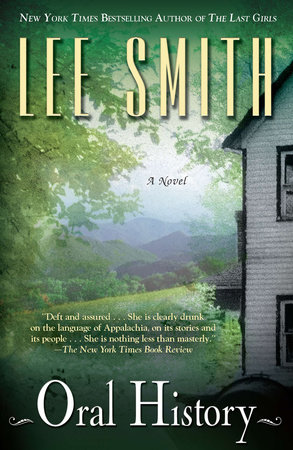From the award-winning New York Times bestselling author of The Last Girls.
Related Genres
ISBN9780425245460
Published onDec 06, 2011
Published byBerkley
Pages352
Dimensions5-1/16 x 7-3/4
A conversation between Lee Smith and Jink Cantrell, a character in Oral History.
Like my own daddy once said, “I need a mountain to rest my eyes against.” So I still go home as often as I can, back to the steep hills and dark hollers of far southwest Virginia where I grew up and where this novel is set. I like to visit relatives and old friends, note the changes in the town and see the new babies, and if there’s time I always drive up the real Hoot Owl Holler and over to the Breaks Interstate Park and out on the state line overlook where I set the fictional burying ground in this novel. Though there’s a well-travelled, paved road leading up here now (instead of the steep trail winding up through the “rocky dimness” of the “laurel hell” I described in the novel)—and though it actually takes twenty minutes by car instead of “half a day” to get here—still yet there’s a feeling which comes over me when I walk out onto this windy peak falling off in sheer cliffs on three sides to the vast deep gorge with hawks circling in the empty air and the Big Sandy River cutting through it way down below, a feeling of timelessness, of immanence, as if these rocks, this very place, would speak. As I stand here this afternoon looking out on space and breathing in heady gulps of the pure mountain air, it all comes back to me just as real as when I first imagined it: this grassy windswept bald on the top of Hoot Owl Mountain, the burying ground.
And they are all here now, or almost all: Pricey Jane, Almarine, Vashti, and even Ora Mae, finally dead at 105, her grave set apart there, higher than the rest, as if she is bound to spend all the days of her death in the same way she spent her life, still looking after the Cantrells “who can’t do a thing without me!” as she used to say. I skirt the sunken graves of Isadore, Bill, and Nun, dead these many years, of tragic Billy, of Little Luther Wade who has finally achieved the fame in death he never saw in life: three CD’s out now, re-mastered from those early recordings Alan Lomax made, one of his songs featured on the “O Brother Where Art Thou” album.
I go to stand at the edge of the cliff where Ora Mae threw those gold earrings off so long ago. The wind rises. It’s getting dark now down below in the almost imaginary gorge of the Big Sandy. The sun still shines up here, though long green shadows lie behind each tree at the edge of the bald. I step back, untie my sweater from my waist and put it on, then turn back to the burying ground, hurrying now over to my favorite place, the little burying house with lattice sides that Almarine built for Pricey Jane out of white oak staves. Dory lies next to her, then Mary, dead so young, then Pearl.
But wait—who’s that? that thin intense young man who leans against the lattice smoking a cigarette, watching me. He wears a rumpled white shirt with an open collar and the snappy blue suit of another era.
I stop walking. “Who are you?” I ask, though somehow I know already.
“Jink Cantrell,” he says, confirming it. I let my breath out slowly and walk over to shake his hand. I’ve been expecting him to show up for years. With a sweeping, courtly gesture, he invites me to sit on the grass and I do, drawing my skirt around my knees. He hunkers down before me. His handsome face is pained and lean though his gray eyes are warm and intelligent. He rolls another cigarette; nicotine has stained two fingers yellow on his right hand. Finally he smiles at me, a crooked and altogether irresistible grin. Suddenly I realize how young he is—I’d place his age at around 28. Just a boy, really. A boy who never lived to grow up.
“Jink–” I finally say. “Where’d you go, Jink? I always thought you’d come back into the novel.”
Jink laughs and shakes his head. “No, I was long gone,” he said, “after that hog-killing business and Mary’s death and all. I went down to Weller Yard and rode one of those Norfolk and Western coal trains up to Charleston, then hopped a freight to Pittsburgh, then St. Louis where I got some more schooling finally.”
“You were such a smart boy,” I remember. “I always thought you’d grow up to be an artist of some kind–-a poet or a novelist, probably. In fact, in a lot of ways I always felt like you were the one who really should have written this novel.”
“No, I ended up as a newspaper reporter in San Francisco, a job which suited me. But I was young, and when war broke out, I joined up and the Army Press Corps which sent me to Europe where I was blown to smithereens in the summer of ’42 on a sunny cypress-lined road outside Siena just at a moment when I’d been idly looking up at the hills and thinking of home. So I never wrote a novel. And I was never buried, either.”
“Oh, I’m so sorry!” This is so horrible that I don’t know what to say.
“It’s okay,” Jink throws back his head to laugh. “I’ve been dead a long time–I’m used to it. It’s not so bad,” he says. “It’s not like you think it is.” In the bright slanting sun he looks as real to me as the warm grass I sit upon, as the squirrel running up that pine tree at the edge of the woods.
“But why have you come back now?” I ask. “Why are you here?”
He grins at me. “Don’t you remember what I said in my section, the only section you gave me in the book?”
I shake my head. “It was a long time ago.”
“‘Sometimes I wisht it was just Dory and Mary and me and him off someplace, someplace pretty, and all the rest of them dead as the dead in the tales they tell…’” he quotes from the novel. “‘I wisht it was Dory and me and him in the little house on that grassy bald where the fine grass grows all around in a perfect circle up on the top of Hoot Owl Mountain.’”
“But Richard Burlage isn’t here,” I point out.
“No, I imagine he’s lying in some fancy Episcopal cemetery in Richmond.” Jink smiles. “But I loved them–” he points a nicotine-stained finger at these old graves–“so I come back from time to time because I feel at home here, or as at home as I can ever be, a wanderer on the earth.”
I shudder.
Jink lights another cigarette, striking the match on the sole of his shoe. “Besides,” he says, “I’ve been wanting to ask you some questions.”
“What kind of questions?” I ask warily.
“Just some questions about you, and about the book.” He grins. “I was known as a crackerjack reporter, after all. So I want an interview.”
I figure it’s the least I can do, under the circumstances. “Shoot!” I say, then flinch at my unfortunate choice of words. “Oh, I’m so sorry—” I begin. “I forgot–”
Jink laughs, waving his cigarette in the air. “Hey, it’s okay. Just because I’m dead doesn’t mean I’m sensitive about it!” He eases back on the grass, getting comfortable, and looks at me intently. “So.” He begins. “Now you grew up right over the mountains here, in Grundy, but did you actually know any people who talked like us—like your characters talk in this novel?”
LEE: Well, sure. I was born in 1944 into a large, extended
family of big talkers, many of whom were already old when I came along. My parents were pretty old, too—and I was an only child, a surprise—they never thought they’d be able to have a child, apparently—so I was always in the company of adults, always hearing stories, whether I was downtown in my father’s dimestore, or politicking up in the hollers with my grandaddy, or just sitting in the kitchen with Mama and her friends, or out on the porch at my grandparents’ house after supper with my head in somebody’s lap while they were telling stories. I grew up on stories, most of them told by people who loved me. So later, when I became a writer, every story I thought of writing seemed to tell itself to me in a human voice. Sometimes it was the main character speaking, but other times it seemed to be the voice of the story itself, speaking in my ear.
I remember the very moment I decided to write this book. I was driving into Grundy from Richlands on Route 460 sometime in the late 70’s and all of a sudden I noticed those TV satellite dishes that had sprung up all over the mountains almost overnight, it seemed to me then, like big grotesque mushrooms. And in that moment I knew it would be only a matter of time before all the kids in the county would start sounding like, say, Dan Rather, instead of like their grandparents. TV is the great leveller, you know. So I wanted to get it down, to preserve the older generations’ colorful and poetic and precise Appalachian English. For instance, all the names they used to have for a little boy: first he was called a “knee-baby;” then, a “little set-along child” when he got old enough to be set on a pallet in the field while the family was hoeing corn; then he’d be a “shirt-tail boy” when he was still considered too young for long pants. Or they might say that a creek running down a mountain “turkey-tails out in the bottom.” I think that’s beautiful–-I love that image! Or that a man had “daddied more babies than anybody else in the county.” I wanted to save all that.
JINK: So you were doing oral history work yourself, to write this book? You were actually taping people?
LEE: Oh, yes. I did that for years. At first I was just doing it for fun, but then I got more systematic. By the time I started writing this book, I had a closet full of tapes, plus notes and old books and maps and songs and recipes and artifacts, everything from guns to old doctor tools, everything you can think of! Here’s one funny little story: when I first started taping my aunt Kate Smith, she was already in her 80’s. So I thought I had to hurry. I thought I was really in a rush! Then she lived to be 107, so there wasn’t any rush after all. I remember her telling me that my uncle Vern—actually he was my great-uncle—came courting her in a “wire-wheeled buggy.” I love details like that.
JINK: The structure of the book is unusual—was it always in sections like this, even in your first draft?
LEE: Well, no. I started off writing it in plain old standard English, but then every time some of my earlier characters started talking, there’d be too much of a contrast between their voices and the standard third-person narration. It made them sound dumb, like they were stereotype hillbillies on Hee-Haw or something. It made me sound like I was condescending to my characters, while in fact, I admired them so much, all those early, self-reliant settlers—they seemed almost mythic in my mind. Condescending was the last thing I wanted to do! So finally I junked the first 100 pages of the first draft and decided to let the characters speak for themselves.
JINK: Thank you! (ironically, blowing a smoke ring)
LEE: You’re welcome!
JINK: And why did you put so many voices in it? Some people have found it hard to follow.
LEE: Oh, I always have too many people in my books. I think
it’s because I was an only child. I always wanted lots of brothers and sisters.
JINK (laughing): But let’s get serious again for a minute. You’ve talked about the “oral” part of the title. Let’s talk about the “history” part. How historical is this book? How much of it is actual history, real fact?
LEE: A lot of it is true, or based on truth. But this
is something I really wrestled with. By the time I
actually started writing it, I had done a lot of real
oral history work, and I had noticed again and again how if you asked, say, five people present at the same event
to tell what happened there, you’d get five different stories. So I had been doing a lot of thinking about how
the story itself really depends upon the individual needs
and dreams and desires of that storyteller. We create
narratives we need, the stories we have to believe in order to live our lives. Sometimes these stories amount to what Ibsen called ‘the saving lie.’ Too much truth can kill you! Denial is often necessary.
Also, what I was trying to do here was to tell the truth—or a lot of truths—about this wonderful and interesting part of the country I come from. But the thought of actually writing history terrified me. Because: how are you ever going to know what’s really true? And what’s not? I had wanted, as I said, to tell the story of this region from the time when it was practically a wilderness right up through the coming of the lumber and coal and tourist industries. I wanted to show how the people had changed from those isolated and fiercely individualistic settlers in my daddy’s stories, living on their small farms and raising practically everything they needed, all the way down to what has been called the “passive dependency syndrome” with generations of people out of work and on public assistance in the later years of this century after the coal boom ended. I wanted to show how the land itself had changed from old-growth forest (one of my own family’s stories involves an early ancestor who actually lived in a tree–imagine! A tree with a hollow trunk big enough to live in) and little hillside farms with their vegetable patches, to the stripped mountainsides and mountaintops and the ensuing floods of today. Even the wildlife changed, and in my own generation—I used to hear the screams of a “painter” (or panther) up on the mountainside behind our house, but of course they’re long gone from these hills now.
I wanted to record the folklore and folklife—tales people told and how they did things, such as kill a hog or make soup or cook. And what they ate—I will never forget the time I was home visiting my grandmother for lunch, expecting maybe green beans and cornbread or her famous corn pudding, only to find her waiting on the porch with her pocketbook, all ready for me to take her to the new Wendy’s which had just opened up at the bend of the river, sure that’s what I’d rather eat, too.
So I wanted to write down the way it was, but the idea of writing real “history” stopped me. It was too much responsibility, I finally decided. I’m not a historian, or a sociologist, I’m a novelist. So I left it up to the readers to put it all together into a coherent history if they can.
JINK: What about Red Emmy? Where did she come from? Was she
really a witch?
LEE: Witch tales are my favorite kind of story, actually. I’d long heard the story of the lonely witch who wants a pretty boy so bad that she pretends to be a “regular gal” to catch him, but then her true “witchy nature” just has to come out, and she “rides him all night” until he is just worn out, too tired to plow, and then he loses his land and that’s the end of everything. And in my part of Appalachia, for some reason, a lot of the witches were red-headed. My favorite cousins Randy and Melissa would tell you that I made Emmy red-headed because they have red hair, but that’s not true! I went by the old stories.
JINK: But was she really a witch, in the novel, I mean?
LEE: Not originally. In my first draft, I actually wrote a section where Red Emmy was talking—she got her own section, just like you—and in it we learn that she was abused by her father, old Isom, and forced to live up on the mountain with him under some pretty terrible conditions. So in that draft, she was crazy, but she was a sympathetic character. She wasn’t really a witch.
JINK: Hey, I’d like to read that section! Why did you take it out?
LEE: My editor, Faith Sale, thought it should go. She didn’t want me to “explain away” Red Emmy, she said—she felt that a mystery should rest at the heart of the book. The minute she said it, I knew she was right. Life itself is a mystery, after all.
JINK: Red Emmy was important to the story, though, anyway—she was the one, I presume, who put that curse on Pricey Jane’s earrings, a curse that would follow whoever wore them down through the generations from Pricey Jane, to Dory, to Maggie, then Pearl. Maggie didn’t die because she gave them to Pearl, right? Pearl died instead.
LEE: Oh, poor Pearl….but you’re right. In a way, Red Emmy was responsible for the whole plot. The earrings always turn up at moments of tragedy.
JINK: Until Ora Mae throws them over the cliff here, at Pearl’s funeral. It seems to me that Ora Mae is really the villain in this book.
LEE: Oh, I don’t know. I don’t think I ever have any real villains in any of my books. The thing is, when I really get to know the characters and figure out what has happened to them to make them the way they are, I always find myself empathizing, like with Red Emmy—
JINK: But Ora Mae caused Dory’s suicide by not giving her Richard Burlage’s message. It was all her fault. Anyway, I hated her when I was a little boy—she was always so mean to everybody.
LEE: True, but it’s complicated. You know that moment when she held the earrings up to her own ears, before she threw them off the cliff? That was so sad, to me—I realized in that moment that Ora Mae would have given anything to be Dory, or Pearl, women capable of real passion, of risking everything for love. I’ll grant you that she’s a terrifying kind of person, though–such a grim, self-satisfied martyr. She gave me the creeps! But she’s not a real villain—she’s not bad through and through. I have to say, it really surprised me when she held those earrings up to her own ears. It explained a lot.
JINK: Oh, come on. How could you be surprised? You’re the one who made her up in the first place.
LEE: That’s true. But once you do that, then your characters always take on a life of their own, and sometimes they’ll even refuse to follow your outline. You don’t know what they’ll do! Sometimes they run away with your whole novel.
JINK:(grinning) I guess I just ran away from your novel! But what about Richard Burlage—I idolized him, of course–but a lot of your readers have hated him. Why did you put him into this novel, anyway?
LEE: Since I was writing from so deeply within the mountain culture, I wanted to present another perspective. And also I wanted to show the difference between Richard Burlage’s self-conscious ideas of “art” as opposed to Little Luther Wade, whom I consider a true artist. But I never have understood why my readers dislike Richard Burlage so much. I didn’t dislike him—I really identified with him, with the way he can’t ever make up his mind, for instance, or settle on a course of action. There’s a lot of me in Richard Burlage, as there is in all my characters. It’s also true that these woods were full of missionary types who came here to “do good”—and some of them kept diaries just to prove how much good they did. In fact, many of them were relentless diarists, and Richard’s voice, his writing, style derives from the tone of these diaries.
He was also suggested to me by my mother’s description of one of her early suitors. “He went to the University of Virginia,” she used to say, “and never got over it!”
Remember how everybody refers to Richard Burlage as a “foreigner”? This is what they still call anybody who wasn’t born and bred in the mountains, no matter how long they’ve lived here. At my mother’s funeral in 1988, for instance, several people told me that she was “real nice, for a foreigner”—even though she’d been married to my father and lived in Grundy for over 50 years! a foreigner —but that’s how insular the mountain culture used to be until very recently. In many places, it’s still this way today.
JINK: But back to Richard, for a minute—what was wrong with him?
LEE: Besides being a romantic, you mean?
JINK: Oh yes, clearly there was something more. I knew this, even as a child.
LEE: Well, again in my mother’s words—he just “got all wrought up” too much. Maybe he was bi-polar. I’m not sure what his exact diagnosis would be today, but certainly he could have used some Prozac, at the least!
JINK: Readers have also been surprised by Dory’s free-and-easy sexuality….in fact, sex seems to be pretty important in this novel.
LEE: Well, I think sex seems to be pretty important in real life, too—along with family, and religion, and place, and all the other major themes. I’m a realist, you know.
JINK: Wait a minute. What about all these curses and witches and ghosts you’ve got running around?
LEE: You seem just as real to me as anybody else. I think reality is a pretty broad concept, obviously.
JINK: (laughing) Obviously!
LEE: Maybe Red Emmy did set it all in motion, but it just occurs to me that I’m actually using two of the oldest plots in literature in this book. One of them is the one you brought up with your question about Richard Burlage–that’s A Stranger Comes to Town. The entrance of the stranger into the static world, the closed society, always calls everything into question.
JINK: And the other is Romeo and Juliet, am I right?
LEE: Exactly! The Richard Burlage — Dory Cantrell romance is the old story of the two young “star-crossed” lovers from different worlds, and it always ends tragically, from the mismatches between gods and mortals on down….it has to.
JINK: But there are some surprises, and some loose threads, in Oral History’s ending. What does Ora Mae mean when she gives Jennifer the tape recorder back and says, “I reckon you’ll find plenty of banging on that tape, everything you wanted to hear”?
LEE: See, what I meant was that, okay, Almarine left the tape recorder running in the haunted house at the beginning of the book…
JINK: Okay. I’m with you so far—
LEE: And then the whole middle part of the book, Red Emmy and Almarine and Dory and Pearl and Sally and all those stories, they were on the tape that Jennifer took back to her class. That’s what was on the tape.
JINK: I didn’t get that.
LEE: I’m afraid nobody got it, and maybe it doesn’t matter anyway. But that’s one of the hardest things about writing a novel, you know–-you have to tell enough, but not too much. You don’t want to insult your readers, but you don’t want to mystify them, either. It’s a fine line. Actually I meant for all these stories to be Jennifer’s oral history project.
JINK: (shaking his head) Poor Jennifer–you’re kind of cruel to her, aren’t you? and what about that kiss? I was shocked. Almarine was her cousin, wasn’t he?
LEE: (laughing) Well, that’s legal now! But that’s something else that wasn’t in my outline. Though it makes a certain crazy kind of sense, I think. Almarine wanted to bust up Jennifer’s condescending preconceived notions of sweet, pastoral “mountain folk,” I believe. Passion and mystery have driven the whole story of her family, after all. But I don’t think she was ever capable of understanding that, or of understanding the real stories on the tape. Maybe she couldn’t even hear them.
JINK: And then at the very end of the book….
LEE: What? I can’t quite hear you…(I lean toward him in the growing darkness.)
JINK: (very faintly) That rocking chair….
LEE: I just meant that no matter how much you try to investigate and find out the facts, or even how much you commercialize and cheapen it, still the past will hold its own secrets. But, Jink! Wait—don’t go! (For suddenly I can see through him; even the gleam of his white shirt is fading. Wind blows through the dark trees.)
JINK: I want….
LEE: What? I can’t hear you. What do you want? (I jump to my feet)
JINK: I want to live….. (But his voice is lost in the cold wind that sweeps across the overlook.)
“I’m sorry—I’m so sorry,” I call out to nobody. But it’s too late. I finished this novel years ago. I’m crying now as I stumble down the path to the parking lot where a ranger has pulled his truck up next to my car. He turns his flashlight in my direction.
“The park is closed, ma’am,” he says. “It closed a half hour ago.”
“I’m leaving right now.” I slam the door and turn the key, filled with an overwhelming sense of guilt and loss as I head back down the winding hardtop road toward town.
Like my own daddy once said, “I need a mountain to rest my eyes against.” So I still go home as often as I can, back to the steep hills and dark hollers of far southwest Virginia where I grew up and where this novel is set. I like to visit relatives and old friends, note the changes in the town and see the new babies, and if there’s time I always drive up the real Hoot Owl Holler and over to the Breaks Interstate Park and out on the state line overlook where I set the fictional burying ground in this novel. Though there’s a well-travelled, paved road leading up here now (instead of the steep trail winding up through the “rocky dimness” of the “laurel hell” I described in the novel)—and though it actually takes twenty minutes by car instead of “half a day” to get here—still yet there’s a feeling which comes over me when I walk out onto this windy peak falling off in sheer cliffs on three sides to the vast deep gorge with hawks circling in the empty air and the Big Sandy River cutting through it way down below, a feeling of timelessness, of immanence, as if these rocks, this very place, would speak. As I stand here this afternoon looking out on space and breathing in heady gulps of the pure mountain air, it all comes back to me just as real as when I first imagined it: this grassy windswept bald on the top of Hoot Owl Mountain, the burying ground.
And they are all here now, or almost all: Pricey Jane, Almarine, Vashti, and even Ora Mae, finally dead at 105, her grave set apart there, higher than the rest, as if she is bound to spend all the days of her death in the same way she spent her life, still looking after the Cantrells “who can’t do a thing without me!” as she used to say. I skirt the sunken graves of Isadore, Bill, and Nun, dead these many years, of tragic Billy, of Little Luther Wade who has finally achieved the fame in death he never saw in life: three CD’s out now, re-mastered from those early recordings Alan Lomax made, one of his songs featured on the “O Brother Where Art Thou” album.
I go to stand at the edge of the cliff where Ora Mae threw those gold earrings off so long ago. The wind rises. It’s getting dark now down below in the almost imaginary gorge of the Big Sandy. The sun still shines up here, though long green shadows lie behind each tree at the edge of the bald. I step back, untie my sweater from my waist and put it on, then turn back to the burying ground, hurrying now over to my favorite place, the little burying house with lattice sides that Almarine built for Pricey Jane out of white oak staves. Dory lies next to her, then Mary, dead so young, then Pearl.
But wait—who’s that? that thin intense young man who leans against the lattice smoking a cigarette, watching me. He wears a rumpled white shirt with an open collar and the snappy blue suit of another era.
I stop walking. “Who are you?” I ask, though somehow I know already.
“Jink Cantrell,” he says, confirming it. I let my breath out slowly and walk over to shake his hand. I’ve been expecting him to show up for years. With a sweeping, courtly gesture, he invites me to sit on the grass and I do, drawing my skirt around my knees. He hunkers down before me. His handsome face is pained and lean though his gray eyes are warm and intelligent. He rolls another cigarette; nicotine has stained two fingers yellow on his right hand. Finally he smiles at me, a crooked and altogether irresistible grin. Suddenly I realize how young he is—I’d place his age at around 28. Just a boy, really. A boy who never lived to grow up.
“Jink–” I finally say. “Where’d you go, Jink? I always thought you’d come back into the novel.”
Jink laughs and shakes his head. “No, I was long gone,” he said, “after that hog-killing business and Mary’s death and all. I went down to Weller Yard and rode one of those Norfolk and Western coal trains up to Charleston, then hopped a freight to Pittsburgh, then St. Louis where I got some more schooling finally.”
“You were such a smart boy,” I remember. “I always thought you’d grow up to be an artist of some kind–-a poet or a novelist, probably. In fact, in a lot of ways I always felt like you were the one who really should have written this novel.”
“No, I ended up as a newspaper reporter in San Francisco, a job which suited me. But I was young, and when war broke out, I joined up and the Army Press Corps which sent me to Europe where I was blown to smithereens in the summer of ’42 on a sunny cypress-lined road outside Siena just at a moment when I’d been idly looking up at the hills and thinking of home. So I never wrote a novel. And I was never buried, either.”
“Oh, I’m so sorry!” This is so horrible that I don’t know what to say.
“It’s okay,” Jink throws back his head to laugh. “I’ve been dead a long time–I’m used to it. It’s not so bad,” he says. “It’s not like you think it is.” In the bright slanting sun he looks as real to me as the warm grass I sit upon, as the squirrel running up that pine tree at the edge of the woods.
“But why have you come back now?” I ask. “Why are you here?”
He grins at me. “Don’t you remember what I said in my section, the only section you gave me in the book?”
I shake my head. “It was a long time ago.”
“‘Sometimes I wisht it was just Dory and Mary and me and him off someplace, someplace pretty, and all the rest of them dead as the dead in the tales they tell…’” he quotes from the novel. “‘I wisht it was Dory and me and him in the little house on that grassy bald where the fine grass grows all around in a perfect circle up on the top of Hoot Owl Mountain.’”
“But Richard Burlage isn’t here,” I point out.
“No, I imagine he’s lying in some fancy Episcopal cemetery in Richmond.” Jink smiles. “But I loved them–” he points a nicotine-stained finger at these old graves–“so I come back from time to time because I feel at home here, or as at home as I can ever be, a wanderer on the earth.”
I shudder.
Jink lights another cigarette, striking the match on the sole of his shoe. “Besides,” he says, “I’ve been wanting to ask you some questions.”
“What kind of questions?” I ask warily.
“Just some questions about you, and about the book.” He grins. “I was known as a crackerjack reporter, after all. So I want an interview.”
I figure it’s the least I can do, under the circumstances. “Shoot!” I say, then flinch at my unfortunate choice of words. “Oh, I’m so sorry—” I begin. “I forgot–”
Jink laughs, waving his cigarette in the air. “Hey, it’s okay. Just because I’m dead doesn’t mean I’m sensitive about it!” He eases back on the grass, getting comfortable, and looks at me intently. “So.” He begins. “Now you grew up right over the mountains here, in Grundy, but did you actually know any people who talked like us—like your characters talk in this novel?”
LEE: Well, sure. I was born in 1944 into a large, extended
family of big talkers, many of whom were already old when I came along. My parents were pretty old, too—and I was an only child, a surprise—they never thought they’d be able to have a child, apparently—so I was always in the company of adults, always hearing stories, whether I was downtown in my father’s dimestore, or politicking up in the hollers with my grandaddy, or just sitting in the kitchen with Mama and her friends, or out on the porch at my grandparents’ house after supper with my head in somebody’s lap while they were telling stories. I grew up on stories, most of them told by people who loved me. So later, when I became a writer, every story I thought of writing seemed to tell itself to me in a human voice. Sometimes it was the main character speaking, but other times it seemed to be the voice of the story itself, speaking in my ear.
I remember the very moment I decided to write this book. I was driving into Grundy from Richlands on Route 460 sometime in the late 70’s and all of a sudden I noticed those TV satellite dishes that had sprung up all over the mountains almost overnight, it seemed to me then, like big grotesque mushrooms. And in that moment I knew it would be only a matter of time before all the kids in the county would start sounding like, say, Dan Rather, instead of like their grandparents. TV is the great leveller, you know. So I wanted to get it down, to preserve the older generations’ colorful and poetic and precise Appalachian English. For instance, all the names they used to have for a little boy: first he was called a “knee-baby;” then, a “little set-along child” when he got old enough to be set on a pallet in the field while the family was hoeing corn; then he’d be a “shirt-tail boy” when he was still considered too young for long pants. Or they might say that a creek running down a mountain “turkey-tails out in the bottom.” I think that’s beautiful–-I love that image! Or that a man had “daddied more babies than anybody else in the county.” I wanted to save all that.
JINK: So you were doing oral history work yourself, to write this book? You were actually taping people?
LEE: Oh, yes. I did that for years. At first I was just doing it for fun, but then I got more systematic. By the time I started writing this book, I had a closet full of tapes, plus notes and old books and maps and songs and recipes and artifacts, everything from guns to old doctor tools, everything you can think of! Here’s one funny little story: when I first started taping my aunt Kate Smith, she was already in her 80’s. So I thought I had to hurry. I thought I was really in a rush! Then she lived to be 107, so there wasn’t any rush after all. I remember her telling me that my uncle Vern—actually he was my great-uncle—came courting her in a “wire-wheeled buggy.” I love details like that.
JINK: The structure of the book is unusual—was it always in sections like this, even in your first draft?
LEE: Well, no. I started off writing it in plain old standard English, but then every time some of my earlier characters started talking, there’d be too much of a contrast between their voices and the standard third-person narration. It made them sound dumb, like they were stereotype hillbillies on Hee-Haw or something. It made me sound like I was condescending to my characters, while in fact, I admired them so much, all those early, self-reliant settlers—they seemed almost mythic in my mind. Condescending was the last thing I wanted to do! So finally I junked the first 100 pages of the first draft and decided to let the characters speak for themselves.
JINK: Thank you! (ironically, blowing a smoke ring)
LEE: You’re welcome!
JINK: And why did you put so many voices in it? Some people have found it hard to follow.
LEE: Oh, I always have too many people in my books. I think
it’s because I was an only child. I always wanted lots of brothers and sisters.
JINK (laughing): But let’s get serious again for a minute. You’ve talked about the “oral” part of the title. Let’s talk about the “history” part. How historical is this book? How much of it is actual history, real fact?
LEE: A lot of it is true, or based on truth. But this
is something I really wrestled with. By the time I
actually started writing it, I had done a lot of real
oral history work, and I had noticed again and again how if you asked, say, five people present at the same event
to tell what happened there, you’d get five different stories. So I had been doing a lot of thinking about how
the story itself really depends upon the individual needs
and dreams and desires of that storyteller. We create
narratives we need, the stories we have to believe in order to live our lives. Sometimes these stories amount to what Ibsen called ‘the saving lie.’ Too much truth can kill you! Denial is often necessary.
Also, what I was trying to do here was to tell the truth—or a lot of truths—about this wonderful and interesting part of the country I come from. But the thought of actually writing history terrified me. Because: how are you ever going to know what’s really true? And what’s not? I had wanted, as I said, to tell the story of this region from the time when it was practically a wilderness right up through the coming of the lumber and coal and tourist industries. I wanted to show how the people had changed from those isolated and fiercely individualistic settlers in my daddy’s stories, living on their small farms and raising practically everything they needed, all the way down to what has been called the “passive dependency syndrome” with generations of people out of work and on public assistance in the later years of this century after the coal boom ended. I wanted to show how the land itself had changed from old-growth forest (one of my own family’s stories involves an early ancestor who actually lived in a tree–imagine! A tree with a hollow trunk big enough to live in) and little hillside farms with their vegetable patches, to the stripped mountainsides and mountaintops and the ensuing floods of today. Even the wildlife changed, and in my own generation—I used to hear the screams of a “painter” (or panther) up on the mountainside behind our house, but of course they’re long gone from these hills now.
I wanted to record the folklore and folklife—tales people told and how they did things, such as kill a hog or make soup or cook. And what they ate—I will never forget the time I was home visiting my grandmother for lunch, expecting maybe green beans and cornbread or her famous corn pudding, only to find her waiting on the porch with her pocketbook, all ready for me to take her to the new Wendy’s which had just opened up at the bend of the river, sure that’s what I’d rather eat, too.
So I wanted to write down the way it was, but the idea of writing real “history” stopped me. It was too much responsibility, I finally decided. I’m not a historian, or a sociologist, I’m a novelist. So I left it up to the readers to put it all together into a coherent history if they can.
JINK: What about Red Emmy? Where did she come from? Was she
really a witch?
LEE: Witch tales are my favorite kind of story, actually. I’d long heard the story of the lonely witch who wants a pretty boy so bad that she pretends to be a “regular gal” to catch him, but then her true “witchy nature” just has to come out, and she “rides him all night” until he is just worn out, too tired to plow, and then he loses his land and that’s the end of everything. And in my part of Appalachia, for some reason, a lot of the witches were red-headed. My favorite cousins Randy and Melissa would tell you that I made Emmy red-headed because they have red hair, but that’s not true! I went by the old stories.
JINK: But was she really a witch, in the novel, I mean?
LEE: Not originally. In my first draft, I actually wrote a section where Red Emmy was talking—she got her own section, just like you—and in it we learn that she was abused by her father, old Isom, and forced to live up on the mountain with him under some pretty terrible conditions. So in that draft, she was crazy, but she was a sympathetic character. She wasn’t really a witch.
JINK: Hey, I’d like to read that section! Why did you take it out?
LEE: My editor, Faith Sale, thought it should go. She didn’t want me to “explain away” Red Emmy, she said—she felt that a mystery should rest at the heart of the book. The minute she said it, I knew she was right. Life itself is a mystery, after all.
JINK: Red Emmy was important to the story, though, anyway—she was the one, I presume, who put that curse on Pricey Jane’s earrings, a curse that would follow whoever wore them down through the generations from Pricey Jane, to Dory, to Maggie, then Pearl. Maggie didn’t die because she gave them to Pearl, right? Pearl died instead.
LEE: Oh, poor Pearl….but you’re right. In a way, Red Emmy was responsible for the whole plot. The earrings always turn up at moments of tragedy.
JINK: Until Ora Mae throws them over the cliff here, at Pearl’s funeral. It seems to me that Ora Mae is really the villain in this book.
LEE: Oh, I don’t know. I don’t think I ever have any real villains in any of my books. The thing is, when I really get to know the characters and figure out what has happened to them to make them the way they are, I always find myself empathizing, like with Red Emmy—
JINK: But Ora Mae caused Dory’s suicide by not giving her Richard Burlage’s message. It was all her fault. Anyway, I hated her when I was a little boy—she was always so mean to everybody.
LEE: True, but it’s complicated. You know that moment when she held the earrings up to her own ears, before she threw them off the cliff? That was so sad, to me—I realized in that moment that Ora Mae would have given anything to be Dory, or Pearl, women capable of real passion, of risking everything for love. I’ll grant you that she’s a terrifying kind of person, though–such a grim, self-satisfied martyr. She gave me the creeps! But she’s not a real villain—she’s not bad through and through. I have to say, it really surprised me when she held those earrings up to her own ears. It explained a lot.
JINK: Oh, come on. How could you be surprised? You’re the one who made her up in the first place.
LEE: That’s true. But once you do that, then your characters always take on a life of their own, and sometimes they’ll even refuse to follow your outline. You don’t know what they’ll do! Sometimes they run away with your whole novel.
JINK:(grinning) I guess I just ran away from your novel! But what about Richard Burlage—I idolized him, of course–but a lot of your readers have hated him. Why did you put him into this novel, anyway?
LEE: Since I was writing from so deeply within the mountain culture, I wanted to present another perspective. And also I wanted to show the difference between Richard Burlage’s self-conscious ideas of “art” as opposed to Little Luther Wade, whom I consider a true artist. But I never have understood why my readers dislike Richard Burlage so much. I didn’t dislike him—I really identified with him, with the way he can’t ever make up his mind, for instance, or settle on a course of action. There’s a lot of me in Richard Burlage, as there is in all my characters. It’s also true that these woods were full of missionary types who came here to “do good”—and some of them kept diaries just to prove how much good they did. In fact, many of them were relentless diarists, and Richard’s voice, his writing, style derives from the tone of these diaries.
He was also suggested to me by my mother’s description of one of her early suitors. “He went to the University of Virginia,” she used to say, “and never got over it!”
Remember how everybody refers to Richard Burlage as a “foreigner”? This is what they still call anybody who wasn’t born and bred in the mountains, no matter how long they’ve lived here. At my mother’s funeral in 1988, for instance, several people told me that she was “real nice, for a foreigner”—even though she’d been married to my father and lived in Grundy for over 50 years! a foreigner —but that’s how insular the mountain culture used to be until very recently. In many places, it’s still this way today.
JINK: But back to Richard, for a minute—what was wrong with him?
LEE: Besides being a romantic, you mean?
JINK: Oh yes, clearly there was something more. I knew this, even as a child.
LEE: Well, again in my mother’s words—he just “got all wrought up” too much. Maybe he was bi-polar. I’m not sure what his exact diagnosis would be today, but certainly he could have used some Prozac, at the least!
JINK: Readers have also been surprised by Dory’s free-and-easy sexuality….in fact, sex seems to be pretty important in this novel.
LEE: Well, I think sex seems to be pretty important in real life, too—along with family, and religion, and place, and all the other major themes. I’m a realist, you know.
JINK: Wait a minute. What about all these curses and witches and ghosts you’ve got running around?
LEE: You seem just as real to me as anybody else. I think reality is a pretty broad concept, obviously.
JINK: (laughing) Obviously!
LEE: Maybe Red Emmy did set it all in motion, but it just occurs to me that I’m actually using two of the oldest plots in literature in this book. One of them is the one you brought up with your question about Richard Burlage–that’s A Stranger Comes to Town. The entrance of the stranger into the static world, the closed society, always calls everything into question.
JINK: And the other is Romeo and Juliet, am I right?
LEE: Exactly! The Richard Burlage — Dory Cantrell romance is the old story of the two young “star-crossed” lovers from different worlds, and it always ends tragically, from the mismatches between gods and mortals on down….it has to.
JINK: But there are some surprises, and some loose threads, in Oral History’s ending. What does Ora Mae mean when she gives Jennifer the tape recorder back and says, “I reckon you’ll find plenty of banging on that tape, everything you wanted to hear”?
LEE: See, what I meant was that, okay, Almarine left the tape recorder running in the haunted house at the beginning of the book…
JINK: Okay. I’m with you so far—
LEE: And then the whole middle part of the book, Red Emmy and Almarine and Dory and Pearl and Sally and all those stories, they were on the tape that Jennifer took back to her class. That’s what was on the tape.
JINK: I didn’t get that.
LEE: I’m afraid nobody got it, and maybe it doesn’t matter anyway. But that’s one of the hardest things about writing a novel, you know–-you have to tell enough, but not too much. You don’t want to insult your readers, but you don’t want to mystify them, either. It’s a fine line. Actually I meant for all these stories to be Jennifer’s oral history project.
JINK: (shaking his head) Poor Jennifer–you’re kind of cruel to her, aren’t you? and what about that kiss? I was shocked. Almarine was her cousin, wasn’t he?
LEE: (laughing) Well, that’s legal now! But that’s something else that wasn’t in my outline. Though it makes a certain crazy kind of sense, I think. Almarine wanted to bust up Jennifer’s condescending preconceived notions of sweet, pastoral “mountain folk,” I believe. Passion and mystery have driven the whole story of her family, after all. But I don’t think she was ever capable of understanding that, or of understanding the real stories on the tape. Maybe she couldn’t even hear them.
JINK: And then at the very end of the book….
LEE: What? I can’t quite hear you…(I lean toward him in the growing darkness.)
JINK: (very faintly) That rocking chair….
LEE: I just meant that no matter how much you try to investigate and find out the facts, or even how much you commercialize and cheapen it, still the past will hold its own secrets. But, Jink! Wait—don’t go! (For suddenly I can see through him; even the gleam of his white shirt is fading. Wind blows through the dark trees.)
JINK: I want….
LEE: What? I can’t hear you. What do you want? (I jump to my feet)
JINK: I want to live….. (But his voice is lost in the cold wind that sweeps across the overlook.)
“I’m sorry—I’m so sorry,” I call out to nobody. But it’s too late. I finished this novel years ago. I’m crying now as I stumble down the path to the parking lot where a ranger has pulled his truck up next to my car. He turns his flashlight in my direction.
“The park is closed, ma’am,” he says. “It closed a half hour ago.”
“I’m leaving right now.” I slam the door and turn the key, filled with an overwhelming sense of guilt and loss as I head back down the winding hardtop road toward town.
Author
Lee Smith
Lee Smith was born in Grundy, VA. She is author of many novels, including the New York Times bestseller The Last Girls, and most recently Guests On Earth. She is a recipient of the Academy Award in Literature from the American Academy of Arts and Letters, the North Carolina Award for Literature, and a Southern Book Critics Circle Award.
Learn More about Lee SmithYou May Also Like

Add to bookshelf
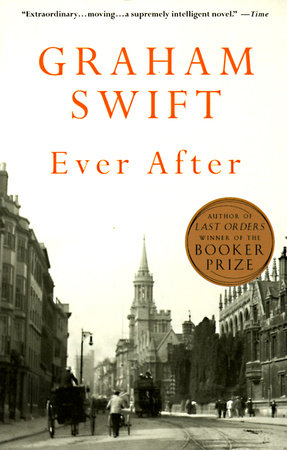
Ever After
Graham Swift
Paperback
$15.95

Add to bookshelf
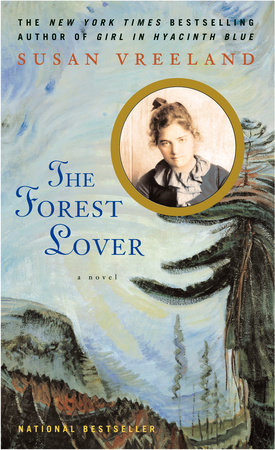
The Forest Lover
Susan Vreeland
Paperback
$22.00

Add to bookshelf
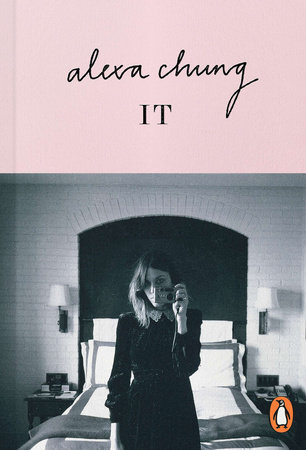
It
Alexa Chung
Paperback
$20.00

Add to bookshelf
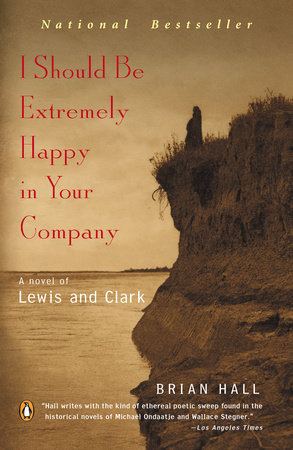
I Should Be Extremely Happy in Your Company
Brian Hall
Paperback
$17.00

Add to bookshelf
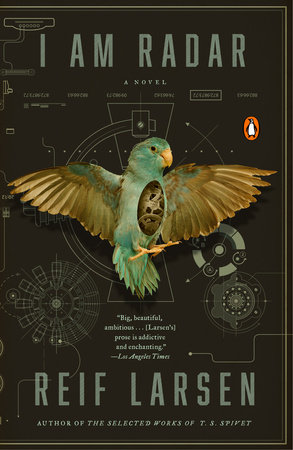
I Am Radar
Reif Larsen
Paperback
$18.00

Add to bookshelf
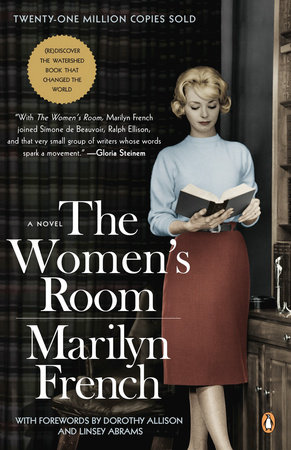
The Women’s Room
Marilyn French
Paperback
$16.00

Add to bookshelf
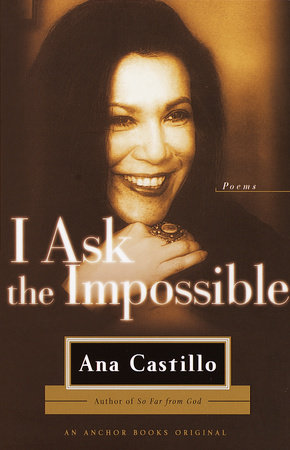
I Ask the Impossible
Ana Castillo
Paperback
$15.00

Add to bookshelf
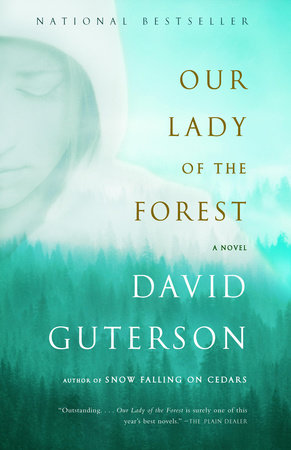
Our Lady of the Forest
David Guterson
Paperback
$18.00

Add to bookshelf
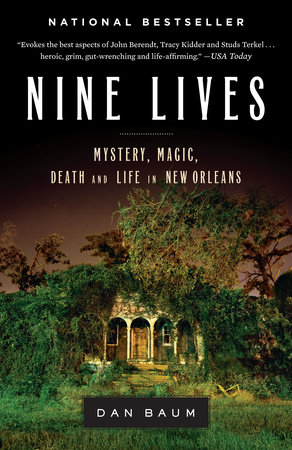
Nine Lives
Dan Baum
Paperback
$20.00

Add to bookshelf
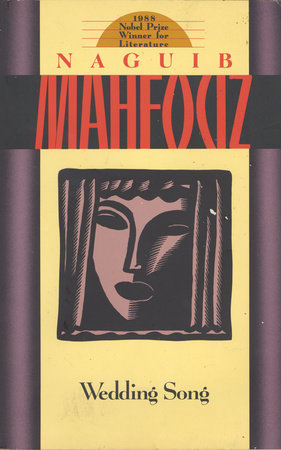
Wedding Song
Naguib Mahfouz
Ebook
$8.99
Download Hi Res
Visit other sites in the Penguin Random House Network
×
Hi,
Member Since
Account Overview Recommendations Orders Account Details Email Preferences Bookshelf








